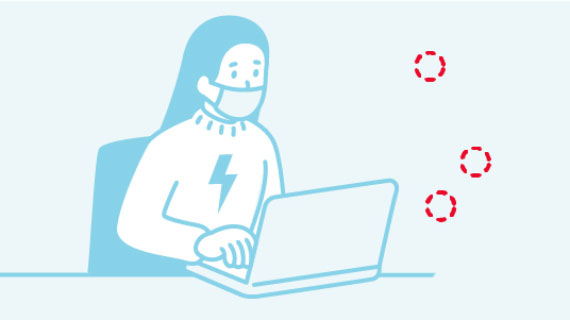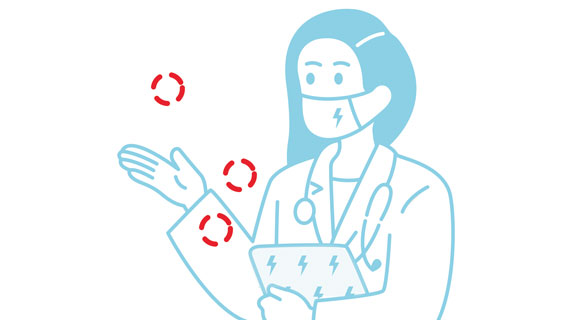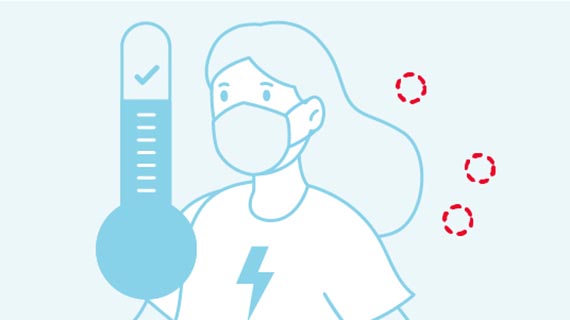SUU's Experts Share COVID-19 Vaccination Information
Posted: November 02, 2021 | Author: Southern Utah University | Read Time: 13 minutes
 To help educate and inform the Southern Utah University community about the COVID-19 vaccination, SUU hosted an information panel on Thursday, October 21, 2021. Hosted by Dr. Camille Thomas, Dean of the College of Health Sciences at SUU, the panel of SUU experts answered questions from the student body.
To help educate and inform the Southern Utah University community about the COVID-19 vaccination, SUU hosted an information panel on Thursday, October 21, 2021. Hosted by Dr. Camille Thomas, Dean of the College of Health Sciences at SUU, the panel of SUU experts answered questions from the student body.
Panelists included Dr. Evan Johnson, associate professor of medicine and biostatistics at the Boston University School of Medicine and adjunct professor at SUU, SheriDawn Neilson, RN, MSN and assistant professor of nursing at SUU, and Dr. Roger Gold, associate professor of biology and microbiology at SUU.
Frequently Asked Questions About the COVID-19 Vaccine
Below are a few of the most frequently asked questions from SUU’s students about the COVID-19 vaccine.
How Does the mRNA Vaccine Work? How is it Different From Past Vaccines?
Answered by Dr. Roger Gold, associate professor of biology and microbiology
It may be a surprise to know that we've been vaccinating people against viruses for over 600 years. We've been using a type of vaccine called an attenuated, or weakened version, of live viruses as vaccines.
These weakened versions of the pathogenic viruses are able to infect our cells, but they're less likely to actually cause disease. They are, however, very successful in teaching our bodies how to recognize and fight the fully pathogenic virus when we encounter it naturally. By allowing these weakened live viruses to infect our cells, there are two branches of our immune system that are activated:
- The first branch, the B cells, make antibodies that try to block infection after exposure. The B cell antibodies are proteins that flow throughout the body and recognize and bind in a very specific way to the surface of viruses and bacteria. If the antibodies are present when you're exposed to a virus, they can bind to the surface of the virus before it binds to your cells, preventing infection.
- The second branch, or T and TC cells, find infected cells and try to kill the cells before the infection can spread. TC cells travel through the body looking for evidence of any sick cells. If they find an infected cell or a cell that's turned cancerous, they try to kill it before the virus or cancer that's growing inside those cells has a chance to fully mature and spread.
A truly effective response against a virus depends on both branches of the adaptive immune system to be actively monitoring and fighting the infection. Up to this point, the only way to activate both branches of the immune system is to use a live virus. Unfortunately, a weakened virus is still alive and there's always the chance it could revert back to its pathogenic form and cause disease.
But mRNA vaccines are different because they don't contain any virus at all. They contain a small piece of genetic material called the messenger RNA, or mRNA, which carries the codes for a single viral protein or even just a small part of that viral protein. Both the Pfizer and the Moderna vaccines use a piece of messenger RNA that codes for different portions of the same protein, the spike protein that allows the coronavirus to bind to our cells.
The vaccine is injected into the upper arm and the messenger RNA enters a few of our muscle cells. Once inside, the muscle cells simply think that the new mRNA is one that we made ourselves. It reads the genetic instructions and builds that portion of the spike protein. The messenger RNA only lives for a few hours and in that time, it's able to code for many copies of that one specific protein.
Because this protein is actively made inside our cells, it's able to activate both branches of our adaptive immune system, both the B cells and the T cells. Our body starts making circulating antibodies that try to block infection and it makes TC cells that specifically recognize those cells that are actively making the spike protein. So if we are later exposed to the actual virus, the antibodies and TC cells are already present and able to fight the infection very quickly and very efficiently and we are immune.
“I've been teaching about mRNA vaccines in my microbiology and immunology classes for over 15 years,” said Dr. Roger Gold. “I've watched the results of tests for a very long time and I've been waiting for the day when mRNA vaccines would be available for us. These vaccines are the safest and most effective vaccines we've had in the 600 years we've been vaccinating ourselves because there are no active viruses involved and yet we can still express the relevant proteins inside our cells and activate both branches of the adaptive immune system.”
Are the COVID-19 Vaccines Safe?
Answered by SheriDawn Neilson, RN, MSN and assistant professor of nursing
A lot of people are afraid that the FDA process was rushed because these vaccines were able to be approved very quickly, but they really weren't rushed. The clinical trials were very rigorous and they met the criteria that they needed to meet.
The two biggest factors in getting these vaccines out fast, in addition to the length of time that these vaccines have been studied, were money and participants in studies. They had a lot of money donated by governments and there were a lot of volunteers that participated in trials, so they were able to overcome those two things very quickly and still be able to do rigorous clinical trials.
After the vaccine was rolled out, the Centers for Disease Control (CDC) introduced a “V Safe” program. When someone went to get their vaccine, they had the chance to be enrolled in the V Safe program. Using a smartphone and an SMS system, participants could send in data about symptoms and any side effects they were experiencing.
“When I got my vaccine, I just used the QR code to sign up for V Safe and then, every day for one week, I filled out a survey about my symptoms,” said SheriDawn Nelson. “After that, I switched to filling out the survey every week and then repeated the same thing when I got my second vaccine. This unprecedented data gathering after a vaccine or medication has been rolled out has resulted in millions of pieces of evidence regarding the vaccine and its symptoms.”
Because of this follow-up research, we also have copious amounts of safety data in pregnancy, probably more so than any other medication.
Historically, almost all side effects from a vaccine will show up within about two months and rarely do we ever see anything as far as a year out. And we are past that point. There are a few rare side effects but nothing very much more than we see in the general population.
How Effective are COVID-19 Vaccines?
Answered by SheriDawn Neilson, RN, MSN and assistant professor of nursing
According to our studies, we began with 90% efficacy with the Alpha and Beta variants. The Delta variant, which is more easily transmitted and it's made younger and healthier people sicker than previous strains, is still sitting at 88% effectiveness against any symptomatic disease and 96% effective against hospitalization from Moderna and Pfizer. Johnson & Johnson is about 71% effective against hospitalization and 95% effective against death.
For comparison, the flu shot each year ranges from 40 to 60% effectiveness with only about 10% effectiveness in 2003, so we're far above the effectiveness of the flu vaccine.
Locally, 78% of patients that are hospitalized at Intermountain Healthcare right now with COVID are unvaccinated, 84% of the ICU COVID patients are unvaccinated, and 87% of the patients on ventilators are unvaccinated.
Why Do Some People Get Sick After They Have Been Vaccinated?
Answered by Dr. Roger Gold, associate professor of biology and microbiology
According to recent studies, the Pfizer and Moderna vaccines have been shown to be about 88% effective. What that means is that 88% of people who receive both doses, will mount a very strong immune response and will be protected from exposure to the virus.
Unfortunately, that means that 12% of people who are vaccinated don't respond properly to the vaccine. They simply don't make the antibodies, or they don't activate the T cells that are needed to fight the virus. There are a few different reasons why someone may not respond effectively to the vaccine.
- Genetic variation in our own immune systems. We all look different because of genetic variation. Some of us have blue eyes, some of us have brown eyes, and that genetic variation also affects the immune system. That means that some people may just not be able to respond as strongly to any given vaccine. With certain genetic makeups, the cells simply lack the ability to recognize that specific portion of the spike protein that's encoded by the vaccine, so the immune system just isn't activated.
- Compromised immune systems. Pre-existing conditions, like cancer, autoimmunity, chronic inflammation, or taking certain immune-suppressant drugs can prevent the body from responding to a vaccine.
- Age. It’s important to note that some components of the immune system actually start to atrophy, or fall apart, as we get older. The thymus, a gland above the heart which is responsible for the development of T cells, starts getting smaller after puberty. By the age of 65, the thymus has shrunk down to almost nothing, meaning that elderly people don't make new T cells and are at an increased risk for disease, even after getting vaccinated.
- Genetic variation in the virus itself. One of the enzymes made by the virus, when it is in our cells, which it uses to replicate itself, is a very sloppy worker. It works very fast to make millions of copies of the virus’s genetic information, but it tends to make a lot of mistakes as it does. Some of these mistakes may change the shape of a spike protein just enough that the antibodies we make in response to the vaccine are not able to recognize the variant, as if the virus becomes disguised and our body simply can't recognize it well enough to fight it, even though we responded well to the vaccine.
These are just some of the reasons why it's so important for everyone to be vaccinated. If the overwhelming majority of people are vaccinated, it becomes increasingly unlikely that an infected person will come in contact with a susceptible person, so those who are unable to respond to the vaccine are still protected by the wall of vaccinated people around them.
" This is why vaccination needs to be a community effort rather than just an individual effort,” said Dr. Roger Gold. "We need to reach 90-95% immunization rates to achieve true herd immunity, and the longer we wait to achieve those levels, the more likely we're going to have new variants that are going to make it less likely that we can eventually eradicate COVID-19."
Can a Vaccinated Person Still Spread the Virus?
Answered by Dr. Roger Gold, associate professor of biology and microbiology
The first time you're exposed, whether to a virus or its vaccine, it takes about 14 days for the immune system to learn how to recognize and fight that virus. After you've been vaccinated, it takes about four to five days before we see the maximum response of our body to that virus. So when you're first exposed, you have about two to four days where yes, the virus is replicating and can be spread even though you may not feel symptoms and don't even know you are sick.
This tells us why, with less than 58% of the adults vaccinated in Utah, it is crucial that we're all vaccinated and that we continue to wear a mask to protect those people around us who are still susceptible.
I Previously Had COVID-19, Do I Still Need To Be Vaccinated? I Have Been Vaccinated; Why Am I Still Asked To Wear a Mask?
Answered by SheriDawn Neilson, RN, MSN and assistant professor of nursing
A COVID infection has three outcomes in the end: about one-third of people develop no antibodies, and in some people, it seems to be a decent proportion of the population, those antibodies will wane within about 60 days while an unknown percentage of the population and the last third develops antibodies. So, it's kind of a gamble as to which one you're going to be.
Reinfection rates also suggest that infection with one variant doesn't necessarily protect against the other variants, but we are seeing protection with the vaccine against multiple variants.
There are a few studies out there that haven't been peer-reviewed yet that suggest the combination of COVID infection plus vaccination produces the best overall immunity. They don't recommend going out and getting a COVID infection and then getting vaccinated, but if you have had COVID, they still recommend getting the vaccination because that gives you what appears to be the best immunity overall.
In terms of wearing masks, even vaccinated individuals still have a 12% chance of reinfection with the 88% efficacy. You can still spread COVID to others if you're sick. Masking helps control those secretions, those droplets that might infect other people.
The FDA Has Authorized Mix-And-Match Booster Shots, is Another Type of Booster Vaccine Effective?
Answered by Dr. Evan Johnson, associate professor of medicine and biostatistics at the Boston University School of Medicine and adjunct professor at SUU
When you have COVID, the response that you build to fight it off, could be very, very different.
People have a very heterogeneous response, meaning while the intention of the vaccine is to target the spike proteins, one may actually develop immunity to other pieces of COVID. Adding the vaccine to that could enhance your body's ability to recognize the spike protein and other parts of COVID in more effective ways. Essentially, the body can develop two ways of fighting that virus.
Doing these different boosters could potentially do the same thing and develop two mechanisms to fight it. The research is not mature in this area, but there is the potential that you could enhance your ability to fight COVID by adding multiple avenues to fight it.
There Are Many Unreliable Sources For Information About COVID-19, Where Can I Find Reliable Information?
Answered by Dr. Evan Johnson, associate professor of medicine and biostatistics at the Boston University School of Medicine and adjunct professor at SUU
We want to help individuals be educated and go to the best sources of information. Our university is putting a lot of responsibility on us as individuals; they're not mandating vaccines or masks, which puts the responsibility on us to be well-informed and well-educated.
There are some great sources out there and looking for the most unbiased sources possible is important and there are a lot of ways to do that.
- Learn how to understand and how to read a scientific study. That way you can see for yourself what those studies are actually doing.
- Know the biases of your sources. If you're getting it from Fox News or CNN, they are going to have a different attitude and different approach. Sometimes these news agencies have biases, and you need to know their biases.
- Know your own bias. Don't come into a study thinking, “I want to validate what I already believe.” Come in with an open mind saying; What does this scientific study show me? What can I learn from it? How can I then synthesize it?
Watch the full panel discussion here:
On-Campus Vaccination Clinics
To help increase vaccination rates on campus, SUU is hosting several vaccine clinics and will provide educational forums this fall with campus and medical experts to answer vaccine and COVID-related questions.
SUU's Health and Wellness Center and the Southwest Public Health Department will be providing three clinics for students, faculty and staff to receive the COVID-19 vaccine. Please bring your ID to all clinics.
- November 9 from 8:30 a.m. to 11:30 a.m. in the Cedar Breaks Room
- December 7 from 8:30 a.m. to 11:30 a.m. in the Cedar Breaks Room
Learn more about on-campus vaccination clinics and educational forums.
SUU continues to monitor the situation and will follow all state and local requirements and standards. Updates on the COVID-19 response and guidelines for the campus community can be found at suu.edu/coronavirus.
This article was published more than 3 years ago and might contain outdated information or broken links. As a result, its accuracy cannot be guaranteed.
Tags: Coronavirus




